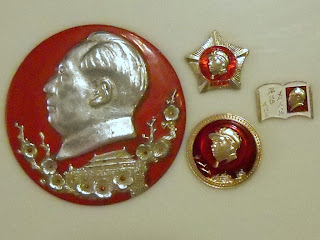Russians must love badges and ornaments. Some Western writers will claim that such devices were a means for a repressed people to show expression. In any event, there is a rich assortment of Soviet era badges,
lapel pins and metallic devices available to the collector.

I found this cap on the shelf of a gift shop in
Sitka. This combination of badges and pins could hardly be representative of anything but a random collection of metallic devices intended to catch the eye of the tourist. As the only reasonably priced item in the shop, this conglomeration soon became a donation to the museum's collection of artifacts. Sitka became the capital of
Russian America in 1808 and was the site of the territorial exchange ceremony when the U.S. took possession of "
Seward's Folly" in 1867.

Russians will say they love beauty and it is certain that most women seem to appreciate fancy and delicate things more than most men. This watch came from a gift shop in Finland. When I asked to see Russian watches, the storekeeper answered, "why do you want to look at Russian watches, we have the finest Japanese watches available." When I told him that I wanted a Russian watch, he insisted, "but they don't keep time", so I had to explain that I wanted it as jewelry for my wife. "Ah", he said. As the story is told, a lady's watch in Russia is for display, not to tell her the time, as "that is the man's job". The painted decoration and time keeping ability of this watch are true to that heritage.

This post concludes with a bow to the
Chang side of the
Cold War Air Museum collection. These
Mao buttons were purchased some years ago from a brother and sister who had a table at a local people's market. They told me a story of how lucky they were to be there and how hard their parents had worked for them to be able to leave China. When asked about the large collection on display they answered that it was only a small portion of what their parents had, and had sent with them. Every time a new button was minted or a new political commissar came to their village, it was safer to make a "donation" for such buttons (as an expression of their loyalty) than to waste their
cash on such frivolous items as food, clothing or oil for their lamps to read at night. Such reading as there was, was strictly for approved study or to memorize passages from "
The Little Red Book".
 I found this cap on the shelf of a gift shop in Sitka. This combination of badges and pins could hardly be representative of anything but a random collection of metallic devices intended to catch the eye of the tourist. As the only reasonably priced item in the shop, this conglomeration soon became a donation to the museum's collection of artifacts. Sitka became the capital of Russian America in 1808 and was the site of the territorial exchange ceremony when the U.S. took possession of "Seward's Folly" in 1867.
I found this cap on the shelf of a gift shop in Sitka. This combination of badges and pins could hardly be representative of anything but a random collection of metallic devices intended to catch the eye of the tourist. As the only reasonably priced item in the shop, this conglomeration soon became a donation to the museum's collection of artifacts. Sitka became the capital of Russian America in 1808 and was the site of the territorial exchange ceremony when the U.S. took possession of "Seward's Folly" in 1867.  Russians will say they love beauty and it is certain that most women seem to appreciate fancy and delicate things more than most men. This watch came from a gift shop in Finland. When I asked to see Russian watches, the storekeeper answered, "why do you want to look at Russian watches, we have the finest Japanese watches available." When I told him that I wanted a Russian watch, he insisted, "but they don't keep time", so I had to explain that I wanted it as jewelry for my wife. "Ah", he said. As the story is told, a lady's watch in Russia is for display, not to tell her the time, as "that is the man's job". The painted decoration and time keeping ability of this watch are true to that heritage.
Russians will say they love beauty and it is certain that most women seem to appreciate fancy and delicate things more than most men. This watch came from a gift shop in Finland. When I asked to see Russian watches, the storekeeper answered, "why do you want to look at Russian watches, we have the finest Japanese watches available." When I told him that I wanted a Russian watch, he insisted, "but they don't keep time", so I had to explain that I wanted it as jewelry for my wife. "Ah", he said. As the story is told, a lady's watch in Russia is for display, not to tell her the time, as "that is the man's job". The painted decoration and time keeping ability of this watch are true to that heritage.  This post concludes with a bow to the Chang side of the Cold War Air Museum collection. These Mao buttons were purchased some years ago from a brother and sister who had a table at a local people's market. They told me a story of how lucky they were to be there and how hard their parents had worked for them to be able to leave China. When asked about the large collection on display they answered that it was only a small portion of what their parents had, and had sent with them. Every time a new button was minted or a new political commissar came to their village, it was safer to make a "donation" for such buttons (as an expression of their loyalty) than to waste their cash on such frivolous items as food, clothing or oil for their lamps to read at night. Such reading as there was, was strictly for approved study or to memorize passages from "The Little Red Book".
This post concludes with a bow to the Chang side of the Cold War Air Museum collection. These Mao buttons were purchased some years ago from a brother and sister who had a table at a local people's market. They told me a story of how lucky they were to be there and how hard their parents had worked for them to be able to leave China. When asked about the large collection on display they answered that it was only a small portion of what their parents had, and had sent with them. Every time a new button was minted or a new political commissar came to their village, it was safer to make a "donation" for such buttons (as an expression of their loyalty) than to waste their cash on such frivolous items as food, clothing or oil for their lamps to read at night. Such reading as there was, was strictly for approved study or to memorize passages from "The Little Red Book".



No comments:
Post a Comment